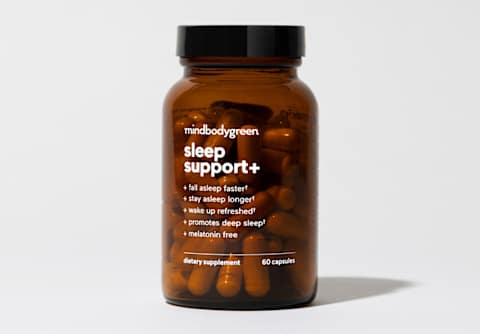Advertisement
A Magnesium Supplement Can Support Quality Sleep, Even If You Aren't Deficient*


Good sleep can be hard to come by. And those of us who are restless with racing thoughts before bed (thanks, stress) will try almost anything to help us settle and relax. And people (myself included) are increasingly turning to natural solutions to help us do just that. Cue, magnesium.
Magnesium is an essential mineral—aka it must come from the diet—involved in over 300 cellular pathways in the body. And it's closely tied to muscle relaxation1 and stress management, all of which play a role in helping you fall asleep faster.*
An estimated 44% of Americans don't get enough magnesium2 in their diet alone, and a supplement could help fill that gap and promote restful sleep.* But after that inadequacy is addressed (or say you're in the half of the population that's already eating enough magnesium), is a sleep-supporting magnesium supplement still going to help?
I asked the experts to find out.
Supplementation goes beyond correcting insufficiencies
According to mindbodygreen's vice president of scientific affairs, Ashley Jordan Ferira, Ph.D., RDN, "The 20th-century nutrition mindset was correcting deficiencies. In the 21st century, we are now focused on optimizing sufficiency and then even targeting functional, personalized benefits beyond gap filling."
And for magnesium, sleep is one of those functional benefits.
Magnesium's role in sleep support
Magnesium takes a multipronged approach to addressing sleep. For starters, it helps calibrate our circadian rhythm3—the body's internal clock that guides your sleep-wake cycle. The mineral also helps induce muscle relaxation4 and ease stress.*
Supplementation has even been found to impact how quickly people fall asleep and how long they stay asleep. In a small 2012 study, researchers found that adults (ages 60 to 75 years) who were given a magnesium supplement for eight weeks5 experienced improvements in those outcomes compared to those who were given a placebo. And those receiving the supplement also had significantly lower levels of the stress hormone cortisol at the end of the study.*
Researchers of a more recent 2022 study looked at overall magnesium intake (from food and supplements) over 20 years and found that those with the highest intake were 36% less likely to experience short sleep duration6 than those with the lowest magnesium intake.
Some magnesium supplements may be more effective than others
"I have recommended magnesium to some of my clients who struggle at bedtime," says registered dietitian Maeson Temple, RDN, L.D., CNSC. "I say 'bedtime' instead of sleep because severe sleep issues tend to require more intervention than a magnesium supplement, and well-designed clinical research on the topic is mixed7."
And not all magnesium supplements are created equal. "For those struggling to wind down, calm their mind, and relax before bed, magnesium glycinate can be a helpful aid," notes Temple. Magnesium can also be paired with other sleep-supporting ingredients like gamma-aminobutyric acid (GABA) and jujube (like mindbodygreen's sleep support+) to promote restfulness.*
"It's important to note that magnesium supplements should be paired with healthful eating habits in the evening and sleep hygiene practices," emphasizes Temple. "It's not a cure-all for overcoming poor nighttime habits."
Do you need to worry about overdoing it on magnesium?
In short, no. "Most people should be concerned about the widespread problem of magnesium inadequacy in our nation, not toxicity," says Ferira. "With close to half of Americans8 failing to consume baseline magnesium needs each day, I would say let's aim for a B- before getting scared about an A+ nutritional status."
But this question was top of mind for me. I eat a pretty magnesium-rich diet, and recent blood work (of both serum magnesium and red blood cell magnesium) showed I had optimal levels. And while there are nuances when it comes to evaluating magnesium status, I wondered if a sleep-supporting magnesium supplement would still benefit me or if it would be too much.
"While supplementation regimens vary depending on the functional outcomes of interest (e.g., sleep support, muscle relaxation, cognition, etc.), 100 to 350 mg of magnesium in supplemental form is not only safe for a healthy adult but genuinely useful. Higher levels should be discussed in partnership with a nutrition-minded health care practitioner," asserts Ferira.
And magnesium gets absorbed and used by the body quickly9 (within 12 to 24 hours). So it's a nutrient that needs to be replenished regularly.
The takeaway
Magnesium is an essential mineral that impacts sleep in multiple ways. Most people aren't getting the magnesium they need through their diet alone, and a high-quality magnesium supplement (like sleep support+) can fill that gap and help promote restful sleep. Even those who are eating a magnesium-rich diet may find falling asleep easier with the added support of taking a magnesium supplement an hour or two before bed.
9 Sources
- https://www.ncbi.nlm.nih.gov/books/NBK541123/
- https://www.ncbi.nlm.nih.gov/pmc/articles/PMC6686054/
- https://www.ncbi.nlm.nih.gov/pmc/articles/PMC4886825/
- https://www.ncbi.nlm.nih.gov/pmc/articles/PMC5622706/
- https://pubmed.ncbi.nlm.nih.gov/23853635/#:~:text=As%20compared%20to%20the%20placebo,in%20significant%20decrease%20of%20ISI
- https://www.ncbi.nlm.nih.gov/pmc/articles/PMC8996025/
- https://pubmed.ncbi.nlm.nih.gov/35184264/
- https://www.ncbi.nlm.nih.gov/labs/pmc/articles/PMC5579642/
- https://www.ncbi.nlm.nih.gov/pmc/articles/PMC4455825/
